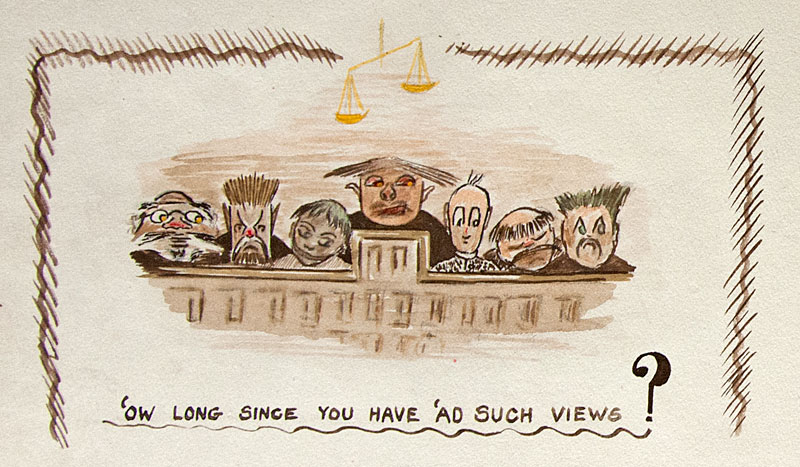Some two thousand Local Tribunals were set up around Britain to honestly and fairly judge the sincerity of men who applied for exemption from military service. As well as conscientious objectors, the Tribunals heard claims for exemption from military service on domestic grounds (people with ill-health, unsupported children or elderly relatives) and from people applying for exemption because they had important civilian jobs, such as doctors, teachers, farmers and key industrial workers. Fewer than 2% of cases heard by the Local Tribunals were applications for exemption on grounds of conscience.
The Tribunals were set up in a similar way to a court but without the professional lawyers and judges. Rather than trained judges, local people were appointed by the local Council to be Tribunal members. The Local Tribunals consisted of between five and twenty-five men (very rarely a woman sat on a Tribunal) from the local community, but usually only five or six Tribunal members would be present at one time. It was their job to question applicants, to judge if they were sincere and to decide whether or not to grant an exemption.
Each Tribunal also had present a Military Representative – often a retired military officer or the local recruiting officer. The Military Representative’s role was to speak on behalf of the army and he was usually opposed to any application for exemption by conscientious objectors.
Appointed because of their social reliability, Tribunal members were supposed to be impartial, tolerant, fair and representative of the local people. Conservative, liberal and socialist beliefs were meant to be represented by the Tribunal members, in proportion to the local community. They often included a local clergyman, councillor, bank manager, and trade union representative.
When the local Council appointed members of the Tribunal, however, they often chose friends, relatives and colleagues. Although they were supposed to be impartial, it is clear that many Tribunal members were biased against COs. They were usually very patriotic and often had little sympathy or understanding for people who were against war. In addition, they rarely had any experience of judging other people’s beliefs and values in a fair way. This biased approach of Tribunal members caused many problems for COs.
Conscientious objectors also faced problems at the Tribunals because the Military Service Act (the law that introduced conscription) was poorly written and was open to different interpretations. A large number of Local Tribunals did not understand, or refused to understand, the new law. Many Tribunals did not understand they could grant absolute exemption to military service (with no conditions) for conscientious objectors and they often saw their role as making sure as many men as possible were enlisted into the army. As a result, thousands of COs were treated unfairly and many of them would suffer harsh treatment in prison.
Before a Tribunal hearing, the applicant’s reasons for applying for exemption from military service (on whatever grounds) were given in a written statement by the applicant. At the hearing the Tribunal members, usually led by the chairman, would ask the applicant questions to try to determine if the reasons he gave for exemption were genuine. Because of the huge number of cases, Tribunal hearings would usually spend only a few minutes on each applicant, and then the Tribunal members would make a decision.
16,000 men who received call-up papers applied to Local Tribunals for exemption from military service on grounds of conscientious objection. Some men were not willing to be forced to do any work at all because they felt it was contributing to the war. Others would do civilian work under civil control but would not work in the army. A third group was willing to join the army as long as they did not have to fight or use weapons.
Each CO had to decide what kind of work, if any, he would be willing to do and what form of exemption he would apply for at the Tribunal.
Conscientious objectors could apply for one of three different kinds of exemption at the Local Tribunal:
1 Absolute exemption from military service
Most men who thought of themselves as COs applied for absolute exemption from military service. If granted complete exemption they would be free to go about their lives as they wished.
2 Conditional exemption from military service
Conditional exemption was often known as ‘alternative service’ or ‘work of national importance’. This meant doing work that was helpful and important for the country. For doctors, farmers and teachers this often meant they could stay in their original job. Others would have to find work considered to be of national importance, which included: agricultural work (farm labouring, market gardening, fixing and producing agricultural machinery); forestry (cutting, moving and preparing timber); food supply (flour and sugar production); shipping (shipbuilding and repairs); transport (fixing railways and canals and working in docks); mining (coal and other minerals); education (teaching) and hospital work (as a doctor, nurse or porter, or working in an ambulance unit).
3 Exemption from combatant duties only
Exemption from combatant duties meant joining the army but not having to fight or use weapons. A non-combatant is someone who does not fight in a war. In March 1916, the Non-Combatant Corps (NCC) was set up - a new section of the army that did not fight or use weapons. According to the War Office the NCC was for ‘ the repair of roads and railways, sanitation, the provision of huts and baths for soldiers coming out of the trenches, and the manufacture and provision of many necessaries of life’. Members of the NCC did everything that a regular soldier did except for fight or handle weapons. They had to follow military orders, perform military training and wear military uniforms.
|


